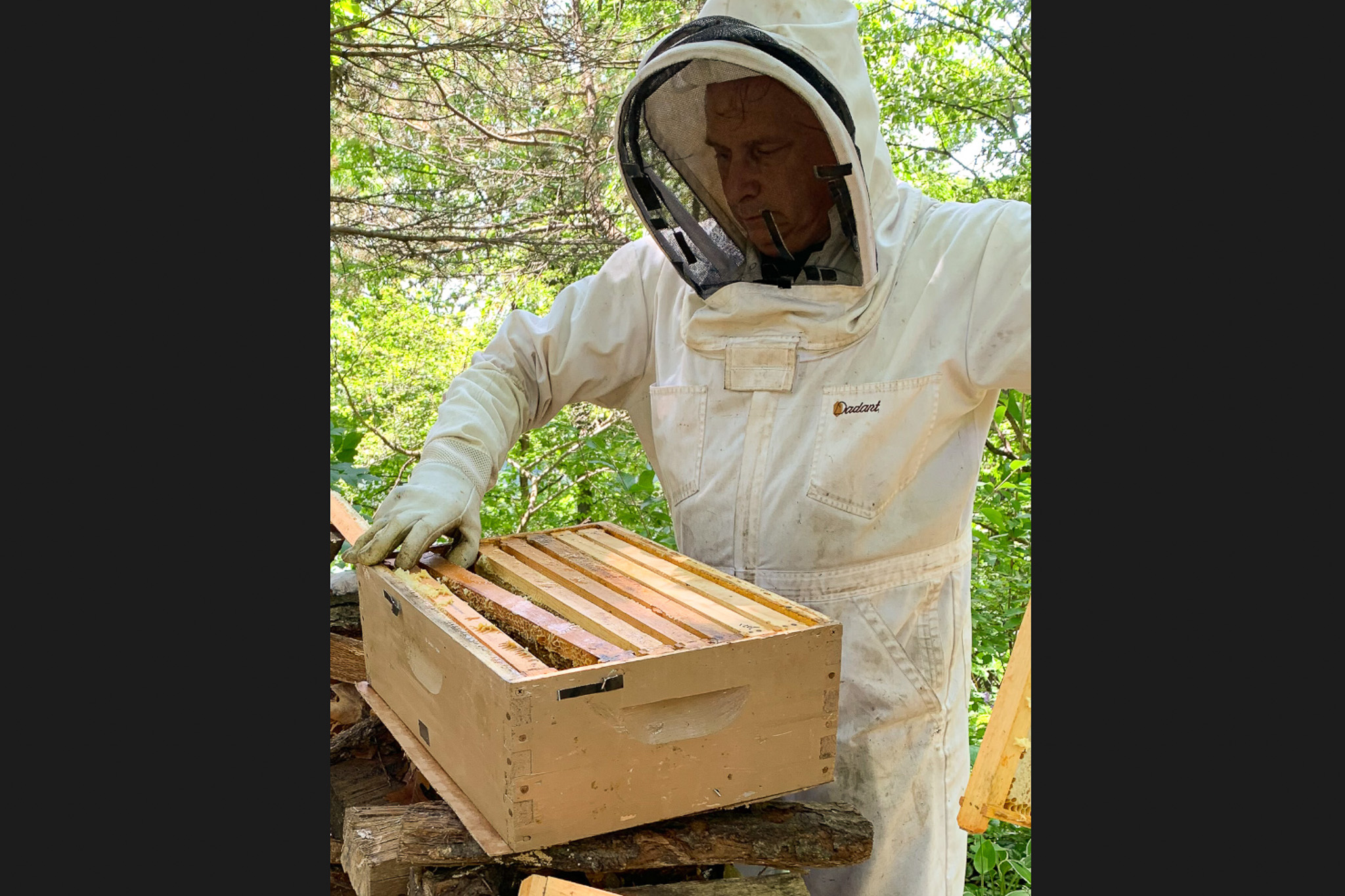Dressed in his black chef cap, long-sleeve cooking jacket and apron dusted with flour from the morning’s prep work, Jeremy Corson took a seat and began to talk about a subject that has little to do with his credentials as a culinary arts graduate and his work as the head chef at Goshen College: Corson is a beekeeper.
“I can talk about bees at length,” Corson said, smiling. He has been keeping bees since 2013.He got his start when a family member asked him to join her in taking up the hobby.
“My sister-in-law, Jennifer, did this,” Corson said. “She wants to own a tea shop someday and honey goes with tea. She was just like, ‘I’m gonna do it. You wanna do it?’ I did it … I found it intriguing so I stayed with it.”
Corson tends hives locally in Milford, Syracuse and Warsaw.
Recently, he installed an observation hive in Scott Bailey’s first grade classroom at Washington STEM Academy in Warsaw. The hive is set between two panes of glass. It’s two frames deep and four frames high with a ventilation tube for the bees to access the outdoors. The structure allows for viewing of all the hive activity. Corson will tend the hive to make sure the bees have food through the winter months.
“Every year, the students are excited to see the bees in the hive,” Bailey said. “They always have many questions and always are wanting to observe them.”
In the spring, Corson will move the hive outdoors. “We have bee suits that are for kids and they are able to go with Jeremy out to the hives we have outside of the school,” Bailey said. “The benefits of having an observation hive in our classroom is priceless. Without Jeremy, this project would not be possible.”
On rare occasions, Corson keeps a hive at his home.
“I enjoy them when I do have them at my house,” Corson said, “because I can sit and watch them in my backyard, watch them in the sunlight in the evening and try and determine what their fly patterns are and see where they’re coming and going from.”
He pulled a napkin from the dispenser on the table and began to draw an image of the hive as he described the workings of each element and the nature of the bee collective.
Out of the 20,000-plus species of bees, only eight are honey bees. Corson’s bees, like most kept for beekeeping in North American, are Apis mellifera. They are overproducers, making more honey than the hive needs to thrive.
According to the National Library of Medicine, honey can provide a protective barrier to prevent infection. In addition, some studies suggest that honey may be beneficial in reducing risks in heart disease, memory loss and cardiovascular disease.
Bees contribute more to our society than just the golden syrup. They are known to be one of the best pollinators according to Andy Ammons, professor of biology and instructor for the Pollinators in Peril course.
Some crops, like almonds, need pollination to produce. “Every one-third piece of food is dependent entirely on pollinators,” Ammons said.
Even the bee sting has been known to have medicinal value. Often attributed to anti-inflammatory properties, the venom has been used historically for easing arthritis symptoms. “They are looking at the properties of the venom,” Ammons said. “It is very complex … 30 to 35 different proteins are involved.”
Much of Corson’s work is done in the spring as the bees are coming out of hibernation. The hives are assembled and sometimes split for new colonies to emerge. In the current season he is getting organized for winter: positioning the hive in an area with lots of sun, putting up windbreaks and placing smaller entrances known as reducers to protect against snow, rain, wind, mice and other invaders.
But what about the honey? Corson has found many uses for his honey, from marinades to salads. It even finds its way into the college menu. “We smoked 100 chickens in our smoker at once and then the last 30 minutes I made a honey and apple cider vinegar wet mop,” he said. “It made a crispy outer coating on the skin. It was delicious and that was honey.”
Printed with the image of a honeycomb and a few bees, his honey bottle labels list the area it is harvested from, some including the name Hillside Honey. It is often found at the Goshen Farmers Market or advertised in the Campus Communicator.
Trisha Handrich, major gifts officer at GC, has been purchasing honey from Corson since 2020. “[I] like to have a jar of honey on hand in my office so that each morning I can add some to my cup of peppermint tea,” she said. “I’m always seeking out good local honey.”
Corson looked over to the small bottle filled with golden honey that sat in the center of the table. “How bees build all that is pretty fascinating,” he said. “They just do it all. The collective of a hive is pretty amazing.”



